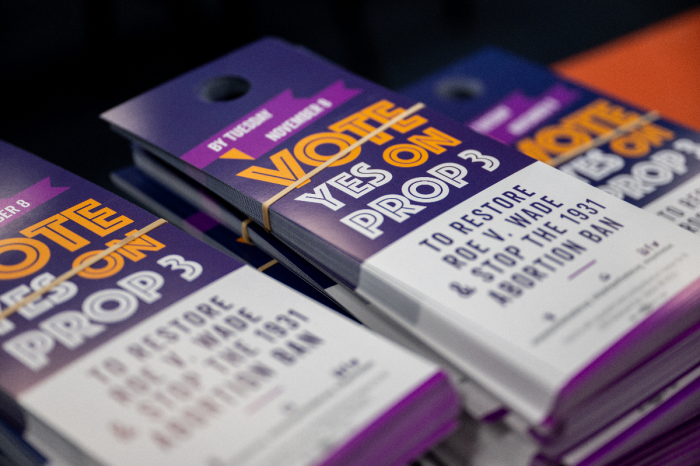Voters enshrine abortion rights in 3 state constitutions; pro-life proposals defeated in 2

After the U.S. Supreme Court's overturning of Roe v. Wade, referendums to enshrine abortion rights into state constitutions were passed on Tuesday, while voters in typically conservative states voted down pro-life proposals.
Several abortion referendums were on the ballot during the 2022 midterm elections. California, Michigan and Vermont all put forward measures to constitutionally codify abortion rights, while Montana and Kentucky sought to protect born-alive infants and deny a constitutional right to abortion.
California
California voted in favor of Proposition 1, also known as Prop 1, a ballot measure to change the California Constitution to guarantee a right to abortion and contraceptives. The measure prohibits the state from interfering with a "person's reproductive freedom."
According to unofficial results from early vote tallies as of Wednesday afternoon, over 65% of Californians voted for the measure, and 35% voted against it.
Public opinion polling indicated that a majority of residents were likely to approve Prop 1. An Oct. 12 poll of 1,216 likely California voters conducted by Rasmussen Reports showed that 59% of Californians planned to vote in favor of the constitutional amendment.
Another survey conducted by the Public Policy Institute of California from Sept. 2-11 of 1,060 likely California voters found that 69% of respondents supported Prop 1, while 25% opposed it.
Critics of the measure, including advocacy groups like the social conservative California Family Council and Pro-Life San Francisco, claim that Prop 1 removes all limitations on abortion by removing the state's viability restriction. California law previously restricted abortions after 24 weeks unless a physician deemed one to be medically necessary.
With the latest measure, pro-life advocacy groups fear that California will now allow "abortion until birth for any reason."
Michigan
Michigan voters approved Proposal 3, also called Prop 3, a ballot measure that amends the state constitution to establish a "fundamental right to reproductive freedom."
While the state may regulate abortion beyond fetal viability unless a physician determines an abortion is medically necessary, Prop 3 allows individuals to make all pregnancy-related decisions without interference.
According to unofficial results tallied as of Wednesday afternoon, 56.7% of voters approved the measure, and 43.3% disapproved.
According to a WDIV/Detroit News poll conducted between Oct. 26-28, 55% of state residents supported the proposal, 41% opposed it, and 3.8% were undecided.
The measure prohibits the state from prosecuting women for having an abortion or individuals who helped her procure one, in addition to eliminating state laws that conflict with this amendment.
Critics of Prop 3 claim the measure authorizes minors to obtain abortions without parental consent or notification and exempts abortionists from proper oversight. However, proponents of Prop 3 claim it does not immediately invalidate parental consent laws unless the issue goes to court.
Kentucky
Residents of Kentucky voted down Constitutional Amendment 2, a measure that would have amended the state's constitution to state that there is no right to abortion or any requirement to fund abortion.
With 98% of precincts reporting, about 52.4% voted of voted against the measure, and 47.6% voted in favor.
The pro-life campaign group Yes for Life supported the measure, urging Kentucky residents to "protect [their] tax dollars from funding late-term abortions." The abortion advocacy group Protect Kentucky Access campaigned against the amendment, encouraging residents to vote no and "keep abortion safe and legal in Kentucky."
After the Supreme Court overturned Roe v. Wade in June, Kentucky banned abortion in nearly all circumstances.
In July, a high court judge temporarily blocked the state's ban on abortions after six weeks gestation and the trigger law that went into effect due to Roe's reversal. Kentucky Court of Appeals Judge Larry E. Thompson reinstated the state's near-total ban on abortion in August.
Montana
Voters in Montana defeated Referendum 131, a measure that states infants born alive at any stage of development after a botched abortion or induced labor are legal persons.
The measure would have required medical care to be provided to born-alive infants, establishing a $50,000 fine and the possibility of as many as 20 years in prison for violating the law.
Of the over 414,000 reported votes as of Wednesday afternoon, 52.2% voted against it, and 47.8% voted in favor.
Vermont
Most Vermont voters voted in favor of Proposal 5, an amendment to the state's constitution that guarantees a "right" to "personal reproductive autonomy" to all individuals in the state.
Of the over 175,000 reported votes as of Wednesday afternoon, 77.2% voted for the measure, and 22.8% voted against it.
Wendy Wilton, a Vermont resident who supports abortion but opposed Proposal 5, expressed concerns about the bill's language in an Oct. 5 op-ed for VTDigger, calling it "vague" and "open-ended." Wilton noted that the bill's language is not restricted to women, questioning whether this means men's rights are "infringed" if his partner wants an abortion, and he doesn't, or vice versa.
"By virtue of the term 'individual,' this does not restrict the language to persons who have achieved legal age or age of consent," she wrote.
The abortion proponent also worries that the legislature has opened the door for late-term abortions beyond the point of viability and when most unborn children can survive outside the womb.
"I am left to think that the proponents are betting Vermont voters will look at this language, believe it to be essential for the preservation of Roe v. Wade and that it is harmless when neither rationale is true," she concluded.
Samantha Kamman is a reporter for The Christian Post. She can be reached at: samantha.kamman@christianpost.com.




























